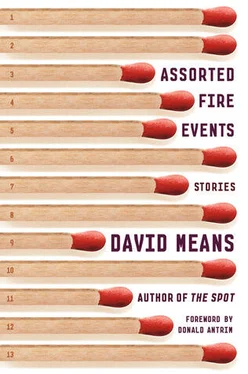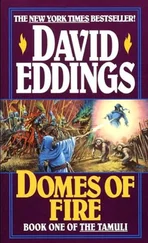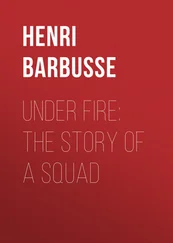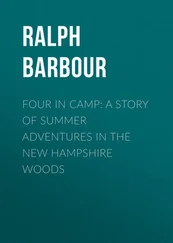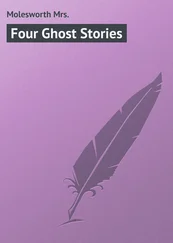David Means - Assorted Fire Events - Stories
Здесь есть возможность читать онлайн «David Means - Assorted Fire Events - Stories» весь текст электронной книги совершенно бесплатно (целиком полную версию без сокращений). В некоторых случаях можно слушать аудио, скачать через торрент в формате fb2 и присутствует краткое содержание. Год выпуска: 2012, Издательство: Faber & Faber, Жанр: Современная проза, на английском языке. Описание произведения, (предисловие) а так же отзывы посетителей доступны на портале библиотеки ЛибКат.
- Название:Assorted Fire Events: Stories
- Автор:
- Издательство:Faber & Faber
- Жанр:
- Год:2012
- ISBN:нет данных
- Рейтинг книги:4 / 5. Голосов: 1
-
Избранное:Добавить в избранное
- Отзывы:
-
Ваша оценка:
- 80
- 1
- 2
- 3
- 4
- 5
Assorted Fire Events: Stories: краткое содержание, описание и аннотация
Предлагаем к чтению аннотацию, описание, краткое содержание или предисловие (зависит от того, что написал сам автор книги «Assorted Fire Events: Stories»). Если вы не нашли необходимую информацию о книге — напишите в комментариях, мы постараемся отыскать её.
won a Los Angeles Times Book Prize, was nominated for a National Book Critics Circle Award, and received tremendous critical praise. Ranging across America, taking in a breathtaking array of voices and experiences, this story collection now stands as one of the finest of our time.
Assorted Fire Events: Stories — читать онлайн бесплатно полную книгу (весь текст) целиком
Ниже представлен текст книги, разбитый по страницам. Система сохранения места последней прочитанной страницы, позволяет с удобством читать онлайн бесплатно книгу «Assorted Fire Events: Stories», без необходимости каждый раз заново искать на чём Вы остановились. Поставьте закладку, и сможете в любой момент перейти на страницу, на которой закончили чтение.
Интервал:
Закладка:
SLEEPING BEAR LAMENT
THIS PRAYER of lamentation — if you’ll forgive the use of those words — began the day we were camping at Sleeping Bear and Rondo went out trashed and got lost. We freaked, waking up, about ten, hungover, blinking off the glare. Amy was in her panties in the orange glow of the tent, leaning over, working into her jeans.
Rondo’s fuckin’ gone, was all she said.
Whaaaa? Ricky said. It was the three of us in there, sleeping like so many logs.
The jerk never came back last night, she said, banging the side of her head a couple of times with the flat of her hand as if she were trying to dislodge something, fix a loose connection. Rondo was her boyfriend, and the panic edging into her voice made me a little jealous because I felt an attraction to her myself, even though he was supposed to be my best friend; we played hockey together at State and pounded each other on the back and drank and stuff like that, putting on a pretense of buddyhood when the truth was the real connection between us was shrouded in mystery, or maybe it was simply physical: we were two pumped-up guys, at the very prime of our physical being — we’ d never, ever be as good-looking, as strong, as virile as we were that fall. It was the opposite with Sam — the subject of my lament — who was gawky and physically inept, dirty and repulsive, his long, clotted hair flapping like a beaver tail against his leather jacket.
That fearful morning I was sure we’d find Rondo’s drunk and bloated body washing up on shore, rolling with a soft lollygag motion in the ten-foot surf of Lake Michigan. Those outside the Midwest think I’m fabricating the height of Lake Michigan waves, just as the idea of a large dune of fine sand in the middle of the country seems delusional, as does perhaps the idea of love between men who consider themselves straight, as I do.
I went out of the tent into the brilliance of an early fall day, all razor grass and mounds of white sand and a few tourists already lining the boardwalks that weave their way through the sand; it was illegal to camp in the park, but for some reason the ranger hadn’t nailed us, or maybe hadn’t seen us, even though we’d slept — judging by the sun — deep into the morning. If you did stake a tent in the camping area, you usually had to get up before sunrise to get away with it. There we were, emerging out of the orange fluorescent tent groggy and hungover, calling out Rondo’s name. Amy was far ahead of us, almost out of sight, in her panic. In that blinding heat and light I didn’t think of Sam’s house down on Burdick, or Sam’s body, which for all I knew had been dug up around there. I didn’t think of Sam until we’d been searching for a good hour, going the length of the beach, walking past the carbonized relic of our driftwood fire, a wreath of red and white crushed Bud cans; going back up onto the huge dune, over that into the rippled swells and the nooks and crannies. On the edges, the trees somehow grew and then were tossed over by high winds to reveal huge, wonderful clumps of roots where you could hunker down and smoke a joint and feel this wonderful gradient of heat and cool at once, the dry taste of dust, the wetness of your lips. I didn’t think of Sam until I was left alone at the end of one of the parking lots, seated on the top rail of a fence, face buried in my palms, giving up on it — knowing in my heart of hearts that Rondo was dead and gone and probably floating to Chicago, his body taking the curve past Gary, Indiana, the spewing stacks of U.S. Steel. There was a deep, empty hollow in my heart, thinking of his muscled torso and his witty grin and the way he could suck beer in those large undulating gulps of his throat. I like to think that in that moment I learned my first lesson about the idiocy of machismo; about how light I was, lightweight, lighthearted, and how the heavy-handed ideals of being a guy were ill suited to me.
Perhaps I knew that all along.
Because one night, years ago, after walking home alone from Sam’s house, I went to my room and wept. That’s how I like to imagine myself: an unformed little kid — a wide-eyed towhead facing for the first time the dark, empty hall of Sam’s house down near the mills, that post-Christmas room of his with only one toy. I couldn’t have been the worldly know-it-all who went into the house and smirked; who left only to tell the other kids that shit-pants Sam didn’t have a toy to his name worth playing with, just a single Matt Mason space center, the same one everyone got last year; that his house was depleted, empty, and that when we went downstairs his old man, back from the mill — in his Elvis hairdo — was grunting down a can of beer, elbows resting on the table, face empty; that his first words were What’s up, shit-for-brains? and that Sam, his face a bright crimson shameful blush, took me to the door and handed me my coat and went with me outside. Let’s get out of here, he said. Bastard.
Did I weep?
Or did I go to school the next day and tell Ted Nelson, who was always looking for a reason to taunt Sam? Did I lay out for him a schematic of the house — the bald spots on the center of each step leading upstairs, the long crevice of broken wood packed with dust along the center of his hallway? Did I hand over to Nelson, like top secret info, the facts of Sam’s situation: dirt poor? Drafty, broken windows patched with cardboard. A stalactite of lime stain hanging from the bathtub spout. Burned-out bulbs. Mattress on floor. A single fucking toy to his name right after Christmas.
On the fence overlooking the parking lot at Sleeping Bear I thought of Sam for the first time in four or five years, conjured up an image of that late afternoon at his house, my only visit, stepping into his kitchen to see his father, bleary-eyed, tired, wearing one of the olive smocks from the paper mill, a little round patch on the right-hand side of his chest with his name in wide, sloppy red stitching, ED; worn out and tired and bored and sad with life, lifting the beer can to his lips before saying what had to be said. The kitchen with its tall, old-fashioned cupboards that went all the way to the high ceiling; the countertops specked with the remains of a floral design; the walls and stove hood coated with grease splatter, embedded with dust; all of it illuminated by a bug-peppered globe. It came to me on the fence at Sleeping Bear — worrying myself into a fit over Rondo’s body, his corpse out there in the lake — how we’d left the house, crossed the street, cut between the two buildings of the mill to the railroad tracks, and past them to the huge sludge pit where Allied Paper poured its waste and where all of us (in my crew) liked to play our witless games of chicken and dare-ya’s; it was all very dangerous, the wide lake of paper waste that crusted over like ice and allowed you a foothold on some days, enough so you could venture out tentatively, then a bit farther if you knew it was strong enough to hold.
Gonna go? was about all Sam said, I think, standing there watching the way the failing light fell dead on the hardened corrugation of sludge. Behind him, in front of a line of haggard trees at the far side, winter birds dipped and dove over the edge of the pit. There was the familiar high-pitched horn of a switcher about half a mile away, coming our way with a string of stock; you could hear the shrill yanks of couplings. Industry was seething on all sides, but at the time we didn’t know it, didn’t care to know it, and for that moment we were just two kids silently daring each other to do something fantastically stupid.
The truth was that at the moment Sam wasn’t really asking me to go but was talking to himself, to his bowed legs and his cheap nylon parka with the orange lining and the fringe of fake fur around the lip of the hood. It seemed more like he was saying some kind of prayer for divine protection, tottering there with the cold evening wind ruffling his hair while he toed the edge of the sludge — it was a betraying substance, not paper or ice or anything else, unworldly crap — and before I could say Sure, I’ll go, and step myself, he was taking tiny little tiptoes out, testing the tension of the gook, feeling the give beneath his mud stompers or old PF Flyers or whatever he was wearing that day. He went ahead. He worked his way about five or six yards out. It was the farthest I’d ever seen one of my fellows go on the crusty surface. We swore it dropped off to fifty feet deep right away, dug at a angle. The switcher train was making its way behind us, flexing and tinging the tracks, and when he got as far as he was willing to go he turned slowly around and faced me and moved his lips, saying something, I’ll never know exactly what; but his lips did move quite a bit, maybe five sentences, reciting for all I knew what might’ve been the Gettysburg Address, which we’d all had to memorize for class that year. Worn out and pathetic, in his cheap thin coat against a hardening wind, Sam, a kid with only a meager toy to his name, stood out on the sludge, speaking:
Читать дальшеИнтервал:
Закладка:
Похожие книги на «Assorted Fire Events: Stories»
Представляем Вашему вниманию похожие книги на «Assorted Fire Events: Stories» списком для выбора. Мы отобрали схожую по названию и смыслу литературу в надежде предоставить читателям больше вариантов отыскать новые, интересные, ещё непрочитанные произведения.
Обсуждение, отзывы о книге «Assorted Fire Events: Stories» и просто собственные мнения читателей. Оставьте ваши комментарии, напишите, что Вы думаете о произведении, его смысле или главных героях. Укажите что конкретно понравилось, а что нет, и почему Вы так считаете.
